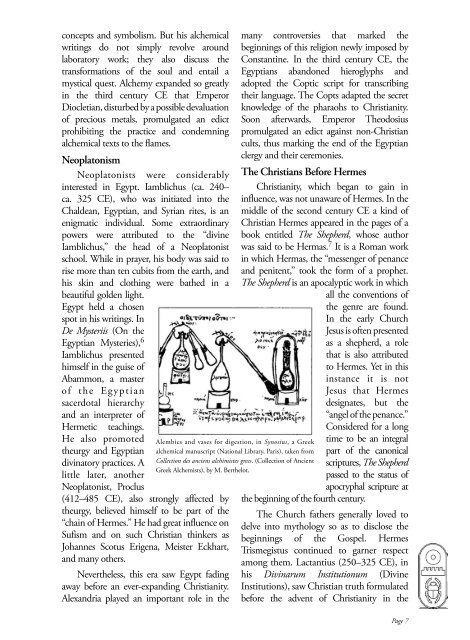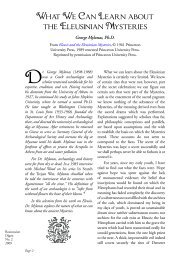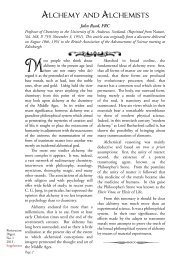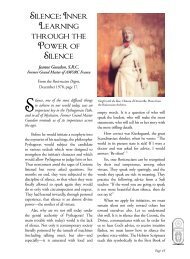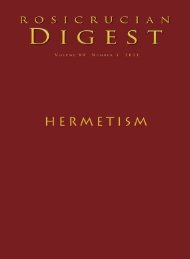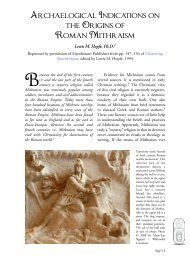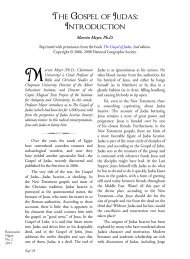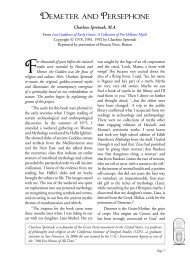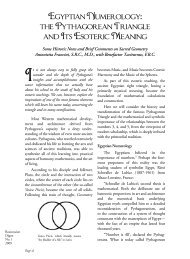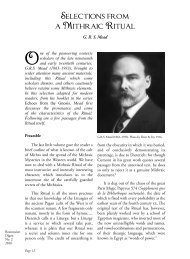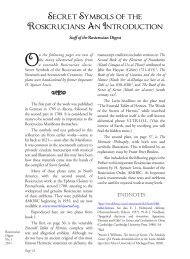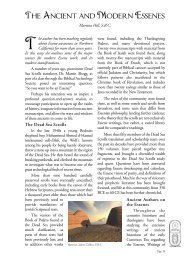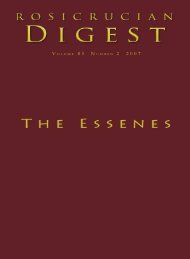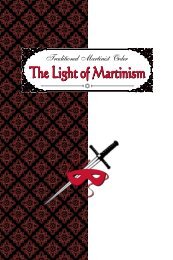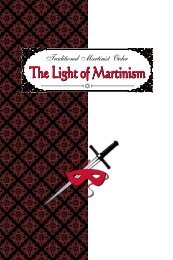Digest - Rosicrucian Order
Digest - Rosicrucian Order
Digest - Rosicrucian Order
Create successful ePaper yourself
Turn your PDF publications into a flip-book with our unique Google optimized e-Paper software.
concepts and symbolism. But his alchemical<br />
writings do not simply revolve around<br />
laboratory work; they also discuss the<br />
transformations of the soul and entail a<br />
mystical quest. Alchemy expanded so greatly<br />
in the third century CE that Emperor<br />
Diocletian, disturbed by a possible devaluation<br />
of precious metals, promulgated an edict<br />
prohibiting the practice and condemning<br />
alchemical texts to the flames.<br />
Neoplatonism<br />
Neoplatonists were considerably<br />
interested in Egypt. Iamblichus (ca. 240–<br />
ca. 325 CE), who was initiated into the<br />
Chaldean, Egyptian, and Syrian rites, is an<br />
enigmatic individual. Some extraordinary<br />
powers were attributed to the “divine<br />
Iamblichus,” the head of a Neoplatonist<br />
school. While in prayer, his body was said to<br />
rise more than ten cubits from the earth, and<br />
his skin and clothing were bathed in a<br />
beautiful golden light.<br />
Egypt held a chosen<br />
spot in his writings. In<br />
De Mysteriis (On the<br />
Egyptian Mysteries), 6<br />
Iamblichus presented<br />
himself in the guise of<br />
Abammon, a master<br />
of the Egyptian<br />
sacerdotal hierarchy<br />
and an interpreter of<br />
Hermetic teachings.<br />
He also promoted<br />
theurgy and Egyptian<br />
divinatory practices. A<br />
little later, another<br />
Neoplatonist, Proclus<br />
(412–485 CE), also strongly affected by<br />
theurgy, believed himself to be part of the<br />
“chain of Hermes.” He had great influence on<br />
Sufism and on such Christian thinkers as<br />
Johannes Scotus Erigena, Meister Eckhart,<br />
and many others.<br />
Nevertheless, this era saw Egypt fading<br />
away before an ever-expanding Christianity.<br />
Alexandria played an important role in the<br />
Alembics and vases for digestion, in Synosius, a Greek<br />
alchemical manuscript (National Library, Paris), taken from<br />
Collection des anciens alchimistes grecs. (Collection of Ancient<br />
Greek Alchemists), by M. Berthelot.<br />
many controversies that marked the<br />
beginnings of this religion newly imposed by<br />
Constantine. In the third century CE, the<br />
Egyptians abandoned hieroglyphs and<br />
adopted the Coptic script for transcribing<br />
their language. The Copts adapted the secret<br />
knowledge of the pharaohs to Christianity.<br />
Soon afterwards, Emperor Theodosius<br />
promulgated an edict against non-Christian<br />
cults, thus marking the end of the Egyptian<br />
clergy and their ceremonies.<br />
The Christians Before Hermes<br />
Christianity, which began to gain in<br />
influence, was not unaware of Hermes. In the<br />
middle of the second century CE a kind of<br />
Christian Hermes appeared in the pages of a<br />
book entitled The Shepherd, whose author<br />
was said to be Hermas. 7 It is a Roman work<br />
in which Hermas, the “messenger of penance<br />
and penitent,” took the form of a prophet.<br />
The Shepherd is an apocalyptic work in which<br />
all the conventions of<br />
the genre are found.<br />
In the early Church<br />
Jesus is often presented<br />
as a shepherd, a role<br />
that is also attributed<br />
to Hermes. Yet in this<br />
instance it is not<br />
Jesus that Hermes<br />
designates, but the<br />
“angel of the penance.”<br />
Considered for a long<br />
time to be an integral<br />
part of the canonical<br />
scriptures, The Shepherd<br />
passed to the status of<br />
apocryphal scripture at<br />
the beginning of the fourth century.<br />
The Church fathers generally loved to<br />
delve into mythology so as to disclose the<br />
beginnings of the Gospel. Hermes<br />
Trismegistus continued to garner respect<br />
among them. Lactantius (250–325 CE), in<br />
his Divinarum Institutionum (Divine<br />
Institutions), saw Christian truth formulated<br />
before the advent of Christianity in the<br />
Page 7


